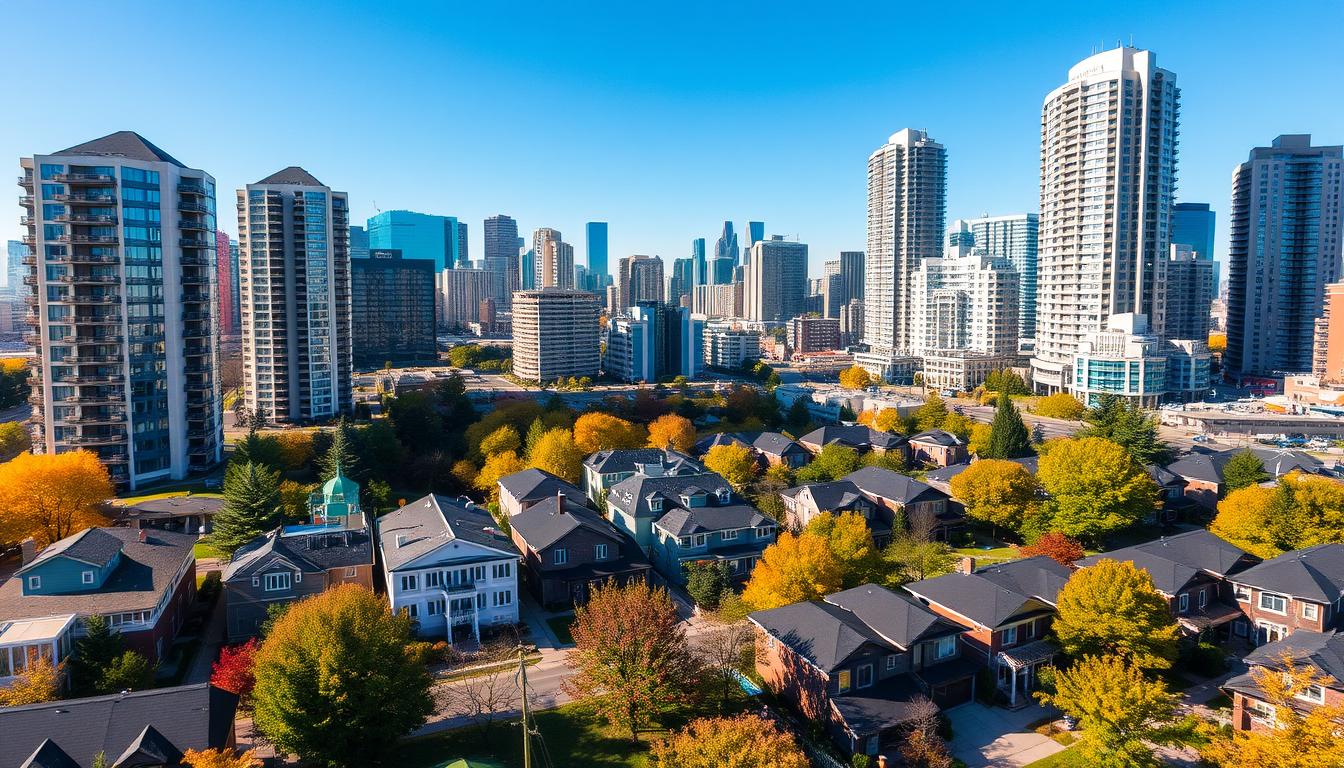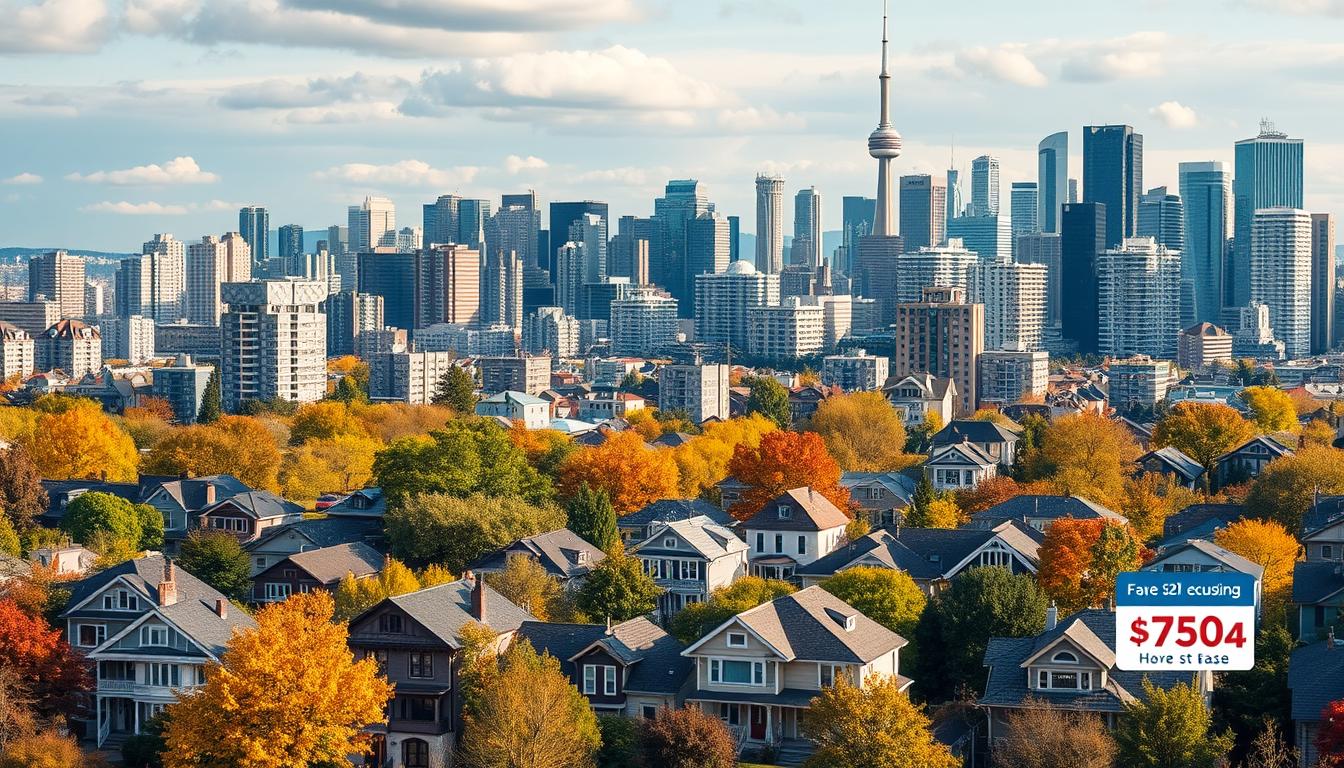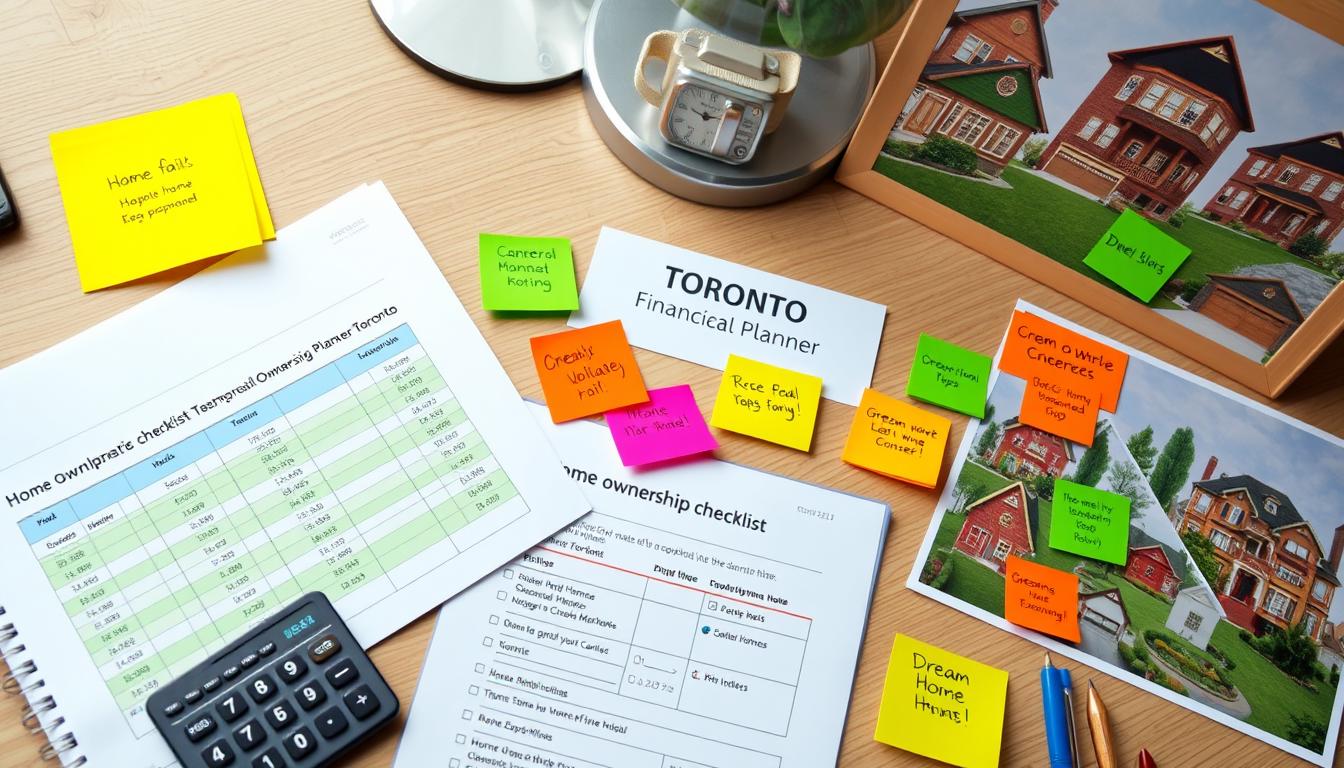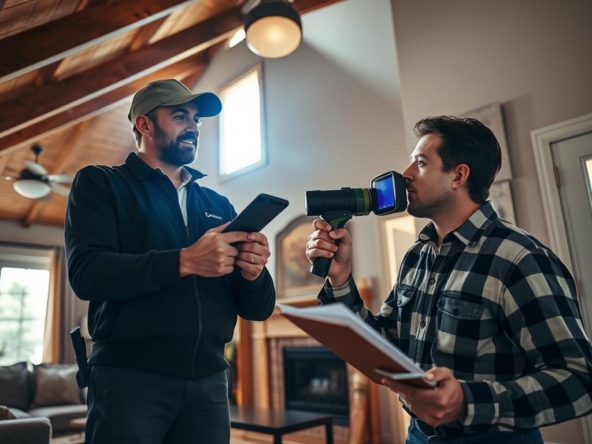Starting your journey to homeownership in Toronto’s lively real estate market is both thrilling and challenging. This guide offers key insights and practical steps to help you through the process. You’ll learn about the market, mortgage options, and how to prepare financially.

Key Takeaways
- Gain an in-depth understanding of Toronto’s real estate market trends and price dynamics.
- Explore the various mortgage options and incentives available for first-time home buyers.
- Discover effective strategies for managing your down payment and closing costs.
- Learn the essential steps and legal considerations involved in the property buying process.
- Uncover common mistakes to avoid and work with experienced real estate professionals for a smooth transaction.
Understanding Toronto’s Real Estate Market Dynamics
Exploring the Toronto housing market can be tricky. But knowing the current trends and prices helps first-time buyers make smart choices. Let’s look at what shapes the real estate scene in this lively city.
Current Market Trends and Prices
The Toronto housing market has seen steady growth, with the average home price at *$1.2 million*. This rise is due to several factors. These include a growing population, limited supply, and strong demand from both local and international buyers.
Neighbourhood Price Comparisons
Prices in Toronto differ a lot between neighbourhoods. For example, homes in the downtown area and central parts of the city often cost over *$1.5 million*. But, you can find more affordable homes in the suburbs, with prices around *$900,000*.
Market Seasonality Impact
- The Toronto real estate market has clear seasonal patterns. The busiest times are usually in spring and summer.
- During these busy seasons, demand is high, and competition fierce. This can lead to bidding wars and higher prices.
- Winter, on the other hand, sees a slower market. This gives buyers more room to negotiate and find deals.
Understanding these market dynamics helps first-time buyers in Toronto plan better. They can make choices that fit their needs and budget.
| Neighbourhood | Average Home Price |
| Downtown Core | $1.5 million |
| Midtown | $1.2 million |
| North York | $1 million |
| Scarborough | $900,000 |

By keeping up with the Toronto housing market, first-time buyers can make more confident choices. This helps them navigate the path to homeownership more effectively.
Financial Preparation for Home Ownership
Buying a home is a big step. It’s important to prepare your finances well. This is especially true in Toronto’s competitive real estate market. Knowing how to manage your budget, plan your finances, and save can help you find your dream home.
First, make a detailed budget for buying a home. Look at your income, expenses, and debts. This will show how much you can spend on a mortgage each month. It also helps you keep some money aside for emergencies.
- Find all your income sources, like your main job, side hustles, or investments.
- Keep track of your regular expenses, like rent, bills, and food.
- Check how much debt you have, including credit cards and loans.
Saving money is also key. Aim to save a big down payment, usually 5% to 20% of the home’s price. This can get you better mortgage rates. Also, save for closing costs, which are about 1.5% to 4% of the home’s price.
| Savings Goal | Estimated Range |
| Down Payment | 5% to 20% of home value |
| Closing Costs | 1.5% to 4% of purchase price |
By carefully planning your budget, saving smartly, and keeping your finances in check, you’re ready for Toronto’s real estate market. You’ll be able to find and buy your dream home.

Navigating Mortgage Options in Toronto
As a first-time homebuyer in Toronto, finding the right mortgage can be tough. But knowing the difference between fixed and variable rates, and the incentives for first-time buyers, can help. This knowledge can lead you to the best financing for your dream home.
Fixed vs Variable Rates
In Toronto, you can choose between fixed-rate and variable-rate mortgages. Fixed-rate mortgages give you stable payments every month. Variable-rate mortgages might start with lower rates but can change over time.
Thinking about the pros and cons of each can help you pick the right one. It depends on your financial situation and how much risk you’re willing to take.
First-Time Home Buyer Incentives
- The First-Time Home Buyer Incentive (FTHBI) gives up to 10% of the home’s price to help with the down payment.
- The RRSP Home Buyer’s Plan lets you use up to $35,000 from your RRSP for a down payment, interest-free.
- First-time buyers in Ontario might get a rebate on the land transfer tax, saving thousands.
Mortgage Pre-Approval Process
Before you start looking for homes, get pre-approved for a mortgage. This lets you know how much you can borrow, the interest rate, and your monthly payments. Being pre-approved makes you a stronger buyer and helps the buying process go smoothly.
| Mortgage Type | Advantages | Disadvantages |
| Fixed-Rate Mortgage | Predictable monthly paymentsProtection from interest rate changes | Higher initial interest ratesLess flexibility |
| Variable-Rate Mortgage | Lower initial interest ratesPotential for savings if rates drop | Unpredictable monthly paymentsRisk of higher interest rates |
“Getting the right mortgage is key to buying a home. Knowing your options and using first-time buyer incentives can set you up for financial success.”
Down Payment Strategies and Requirements
Buying a home in Toronto’s competitive real estate market can be tough, especially the down payment. But, with the right strategies and knowledge, first-time buyers can get past this big financial challenge.
The minimum down payment in Toronto is a key thing to think about. Usually, you need 5% of the home’s value. But, in Toronto’s fast-paced market, aiming for 20% can save you from extra insurance costs.
There are many down payment options for first-time buyers. These include:
- Saving diligently over time
- Using down payment assistance programs from the government or local groups
- Tapping into RRSPs or other investment accounts
- Getting money gifts from family members
Many down payment assistance programs in Toronto offer great help. They provide resources and even financial aid to help first-time buyers meet the minimum down payment. These programs can be a big help in making homeownership possible.
| Down Payment Option | Minimum Required | Advantages |
| Savings | 5-20% | Builds equity, no extra costs |
| RRSP Withdrawal | 5% of home value | Tax-free, flexible repayment |
| Down Payment Assistance | Varies by program | Grants, loans, and other financial aid |
By looking into these down payment options and knowing the minimum down payment needs in Toronto, first-time buyers can move closer to their dream of owning a home.
Essential Steps to Buy Property in Canada
Buying a home in Canada, especially in Toronto, is exciting but complex. First-time buyers need to know the key steps and requirements.
Documentation Requirements
The first step is to gather all needed documents. You’ll need personal ID, proof of income, down payment, and credit history. Having these ready will make the application and approval smoother.
Legal Considerations
Buying a property in Canada has legal aspects to consider. You should hire a real estate lawyer. They will help with the contract, title searches, and following local laws.
Timeline Expectations
- Initial property search and viewing: 2-4 weeks
- Securing pre-approval and financing: 1-2 weeks
- Offer submission and negotiation: 1-2 weeks
- Completing the home inspection and legal review: 2-4 weeks
- Closing and possession: 4-6 weeks
The timeline can change based on the property, market, and transaction complexity. Working with your agent and lawyer can help manage expectations.
“Buying a home is one of the biggest financial decisions you’ll make in your lifetime. By understanding the essential steps and requirements, you can approach the process with confidence and ensure a successful property purchase.”
Working with Real Estate Professionals
Buying your first home in Toronto is a big step. It’s crucial to have a team of experts by your side. They will help you through the process, making it smooth and successful.
Real estate agents are at the core of your team. They know the local market well. They help with property listings, negotiations, and the whole buying process. They offer insights on neighbourhoods, prices, and how to negotiate.
Mortgage brokers are also key. They help you find the best financing options. They guide you through different mortgage products and get you the best rates for your budget.
Property lawyers take care of the legal and financial parts of buying a home. They check contracts, do title searches, and protect your interests during the closing.
Choosing your team is important. Look for referrals, check their credentials, and make sure they know the Toronto market. With the right team, you’ll make smart choices and own your dream home.
“Working with a skilled team of real estate professionals can make all the difference in your home-buying journey. They are your trusted guides, navigating the complexities and ensuring your interests are protected every step of the way.”
Property Types and Housing Options in Toronto
Finding your dream home in Toronto can feel overwhelming. The city has everything from modern condominiums to cozy detached homes. Each type has its own benefits and drawbacks. Knowing these can help you choose the right home for you.
Condos vs. Houses
Condominiums, or condos, are very popular in Toronto. They offer a compact, easy-to-maintain living space. They often have great amenities like gyms and pools. This makes them perfect for those who want a hassle-free lifestyle.
Detached homes give you more room, privacy, and the chance to make your space your own. However, they need more care and are pricier.
New Builds vs. Resale Properties
New developments in Toronto offer modern features and the chance to customize. But, they can be pricey. On the other hand, resale properties have established neighborhoods and may appreciate in value. They might need some updates to fit your taste.
Freehold vs. Leasehold
In Toronto, you can buy freehold or leasehold properties. Freehold means you own the land and building outright. Leasehold means you have a long-term lease, usually 99 years or more. Choosing between these can affect your finances and legal rights, so it’s crucial to understand the differences.
Exploring Toronto’s diverse housing options can be challenging but rewarding. By thinking about your lifestyle, budget, and future plans, you can find the ideal home in this lively city.
Home Inspection and Property Assessment
When you buy a property in Toronto, it’s key to get a property inspection and home assessment. This detailed check helps you know the building condition. It also spots any issues or repairs needed, helping you decide wisely.
A certified inspector will look at every part of the property, from the roof to the foundation. They check the electrical, plumbing, and HVAC systems. They also look at the building’s structure. This thorough check can find hidden problems, giving you a real picture of the property.
- They find structural issues like cracks, foundation problems, or water damage.
- They check the age and state of big systems like the roof, windows, and insulation.
- They see if the electrical, plumbing, and HVAC systems work right.
- They spot safety risks like old or bad wiring.
- They give a detailed report with their findings and advice.
The home assessment report can help you talk price or ask the seller to fix things. A good property inspection saves you from surprises and big costs later. It makes sure your Toronto home is a good investment.
| Inspection Item | Potential Issues | Impact on Purchase |
| Roof Condition | Leaks, missing shingles, structural damage | Significant repair costs or replacement needed |
| Foundation | Cracks, settling, water damage | Structural integrity concerns, costly repairs |
| Electrical System | Outdated wiring, lack of grounding, insufficient capacity | Fire hazards, need for extensive upgrades |
| Plumbing | Leaks, old pipes, low water pressure | Potential water damage, costly replacements |
By carefully inspecting the property and assessing its condition, you can make a smart choice. This ensures your Toronto home is a wise investment.
Understanding Closing Costs and Additional Expenses
As a first-time home buyer in Toronto, it’s key to know about closing costs and extra expenses. These costs can affect your budget a lot. So, it’s important to plan for them well.
Legal Fees
Legal fees are a big part of buying a home. They usually cost between $1,000 and $2,500. These fees cover things like title searches and document preparation.
Land Transfer Tax
The land transfer tax is another big cost. It’s a fee from the government when you buy a property. First-time buyers pay 1.5% of the home’s price, and repeat buyers pay 2%.
Insurance Requirements
- Property Insurance: You’ll need to get property insurance to protect your home. This can cost between $800 and $2,000 a year, based on your home’s size and coverage.
- Closing Costs Toronto: Besides legal fees and land transfer tax, there are other costs. These include title insurance, land survey fees, and mortgage-related expenses.
Knowing about closing costs Toronto, land transfer tax, and property insurance helps you prepare your finances. This makes buying a home in Toronto smoother.
| Expense | Estimated Cost |
| Legal Fees | $1,000 – $2,500 |
| Land Transfer Tax (First-Time Buyer) | 1.5% of Home Purchase Price |
| Land Transfer Tax (Repeat Buyer) | 2% of Home Purchase Price |
| Property Insurance | $800 – $2,000 per year |
By including these extra costs in your plan, you can avoid surprises. This helps you have a solid financial plan for buying your dream home in Toronto.
Negotiation Strategies for Toronto’s Market
In Toronto’s competitive real estate market, knowing how to negotiate is key. As a first-time buyer, it’s important to understand how to make offers, handle bidding wars, and use conditional offers. These strategies help protect your interests while making your offer appealing to sellers.
Making a competitive offer is crucial. This means researching recent sales, knowing the market trends, and working with your agent. Together, you can create an offer that shows the property’s value and is smart financially.
Dealing with bidding wars is another skill you need. By getting ready for multiple offers, you can plan how to handle counter-offers and negotiations. This way, you can get the property without paying too much.
Conditional offers are also important. By adding conditions like financing or inspections, you protect yourself. At the same time, you show the seller you’re serious, making your offer more appealing.
| Negotiation Strategy | Key Considerations |
| Competitive Offer | Research recent comparable salesUnderstand current market trendsWork with your agent to craft an appealing offer |
| Bidding Wars | Anticipate and prepare for multiple offersDevelop a strategic approach to counter-offers and escalation clausesNegotiate effectively in the final stages |
| Conditional Offers | Carefully craft conditions related to financing, home inspections, or other contingenciesBalance protective conditions with an attractive offer to the seller |
By learning these negotiation strategies, first-time buyers in Toronto can confidently navigate the market. This increases their chances of finding their dream home.
Common First-Time Buyer Mistakes to Avoid
Buying a home in Toronto for the first time is exciting. But, it’s important to avoid common mistakes. One big mistake is not doing enough research. Not checking the neighbourhood, the property’s condition, or the local market can lead to bad choices.
Working with a trusted real estate agent and getting a detailed inspection is key. This helps avoid surprises later on.
Due Diligence Oversights
Many first-time buyers don’t realize how important due diligence is. Not looking into the neighbourhood’s amenities, transport, and future plans can lead to a bad choice. Also, skipping a professional home inspection can mean expensive repairs later.
Financial Planning Errors
Planning your budget is a big part of buying a home, but it’s often ignored. Not including closing costs, maintenance, or financial changes can ruin your plans. It’s important to talk to a mortgage expert and financial advisor to make sure you can afford it.
Timing Missteps
The timing of your home purchase is crucial in Toronto’s fast-changing market. Rushing into a decision without thinking about market trends, interest rates, and your own situation can be a mistake. Being patient and flexible is important. This way, you can find the right opportunity when it comes along.
FAQ
What are the current market trends and prices in Toronto’s real estate market?
Toronto’s real estate market has seen big growth lately. Prices keep going up in different areas. First-time buyers need to know about the market and how seasons affect prices.
How can I financially prepare for homeownership in Toronto?
Getting ready financially is key for first-time buyers in Toronto. You should make a budget, save smartly, and check if you’re ready financially. This makes buying a home easier.
What mortgage options are available to me as a first-time buyer in Toronto?
You can choose from fixed-rate and variable-rate mortgages. Knowing about first-time buyer incentives and getting pre-approved can help you get good financing.
What are the down payment requirements and strategies for first-time buyers in Toronto?
The down payment needed in Toronto can be tough for first-timers. Look into different saving plans and help programs to meet this challenge.
What are the essential steps in the property purchase process in Canada?
Buying property in Canada has several important steps. You need to get the right documents, understand legal stuff, and plan your timeline carefully.
How can working with real estate professionals benefit me as a first-time buyer in Toronto?
Working with experts like real estate agents, mortgage brokers, and lawyers can really help. They offer valuable advice and help throughout your buying journey.
What are the different property types and housing options available in Toronto?
Toronto has many property types, like condos, houses, new builds, and resale homes. Knowing the differences, like freehold vs leasehold, helps you choose wisely.
Why is a home inspection and property assessment important in Toronto?
A detailed home inspection and assessment are vital in Toronto. They find any problems and help you make a smart choice.
What are the closing costs and additional expenses I should consider when buying a home in Toronto?
Besides the price, there are closing costs like legal fees, taxes, and insurance. It’s important to budget for these to avoid surprises.
How can I effectively negotiate in Toronto’s competitive real estate market?
To negotiate well in Toronto, be strategic. Make competitive offers, handle bidding wars, and use conditional offers to protect your interests.
What are some common first-time buyer mistakes to avoid in Toronto’s real estate market?
First-time buyers should watch out for common mistakes. These include not doing your homework, financial planning errors, and timing issues. Knowing these can help you buy successfully.
Your Trusted Real Estate Agent in Toronto
Looking for expert assistance to buy or sell your property in Toronto? Contact us today to work with a professional real estate agent who knows the market inside and out!
Get in TouchBusiness Contact Details
- Address: 305 Milner Ave Unit # 312, Toronto, ON M1B 3V4, Canada. Get Direction - Google Map
- Contact Name: Sivage Sivagumaran
- Phone: +1 416-553-8902
- Email: sivagehomes@sivage.ca
Visit our website at SivageRealty.ca for the latest property listings and personalized services. Let us help you turn your real estate goals into reality. Your dream property is just a call away!
Disclaimer:
The content provided in this blog is for informational purposes only. We recommend consulting with a qualified professional before making any decisions based on the information provided. If you have any questions or concerns, please don't hesitate to reach out to us. Our contact information is available on the Contact page.




